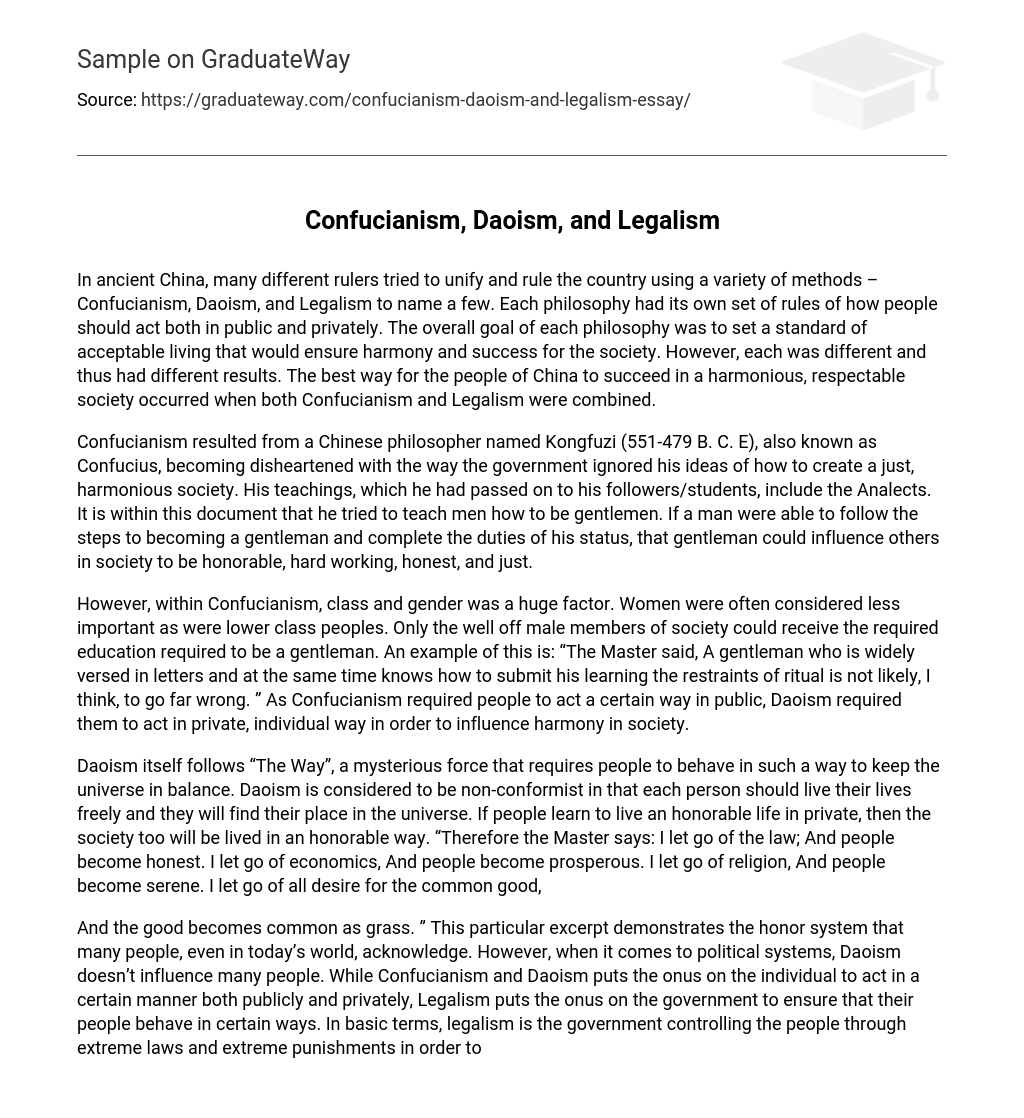In ancient China, many different rulers tried to unify and rule the country using a variety of methods – Confucianism, Daoism, and Legalism to name a few. Each philosophy had its own set of rules of how people should act both in public and privately. The overall goal of each philosophy was to set a standard of acceptable living that would ensure harmony and success for the society. However, each was different and thus had different results. The best way for the people of China to succeed in a harmonious, respectable society occurred when both Confucianism and Legalism were combined.
Confucianism resulted from a Chinese philosopher named Kongfuzi (551-479 B. C. E), also known as Confucius, becoming disheartened with the way the government ignored his ideas of how to create a just, harmonious society. His teachings, which he had passed on to his followers/students, include the Analects. It is within this document that he tried to teach men how to be gentlemen. If a man were able to follow the steps to becoming a gentleman and complete the duties of his status, that gentleman could influence others in society to be honorable, hard working, honest, and just.
However, within Confucianism, class and gender was a huge factor. Women were often considered less important as were lower class peoples. Only the well off male members of society could receive the required education required to be a gentleman. An example of this is: “The Master said, A gentleman who is widely versed in letters and at the same time knows how to submit his learning the restraints of ritual is not likely, I think, to go far wrong. ” As Confucianism required people to act a certain way in public, Daoism required them to act in private, individual way in order to influence harmony in society.
Daoism itself follows “The Way”, a mysterious force that requires people to behave in such a way to keep the universe in balance. Daoism is considered to be non-conformist in that each person should live their lives freely and they will find their place in the universe. If people learn to live an honorable life in private, then the society too will be lived in an honorable way. “Therefore the Master says: I let go of the law; And people become honest. I let go of economics, And people become prosperous. I let go of religion, And people become serene. I let go of all desire for the common good,
And the good becomes common as grass. ” This particular excerpt demonstrates the honor system that many people, even in today’s world, acknowledge. However, when it comes to political systems, Daoism doesn’t influence many people. While Confucianism and Daoism puts the onus on the individual to act in a certain manner both publicly and privately, Legalism puts the onus on the government to ensure that their people behave in certain ways. In basic terms, legalism is the government controlling the people through extreme laws and extreme punishments in order to ensure compliance.
Legalism was introduced during the Qin Unification of China in 247 B. C. E. by Li Si, a Qin official. The goal was to unite China under one ruler. While the goal of legalism is a good one, the militant measures used to enforce it were not well accepted by the people who were considered anti-social and of need of extreme government leadership. Legalism applied to all social classes – anyone who broke the laws was punished regardless of status. Status was only gained through military efforts – one had to join the military in order to receive a high rank.
The main idea in legalism was that the Emperor was always right – his rules were to be obeyed at all times. If they were not, then the punishment was severe enough to dissuade others from breaking the laws. If there is dissent and it is not dealt with using corrective measures, then the government, and thereby society, will fall apart. One such example of this can be found in the Han Feizi document. It says, “The law alone leads to political order. If laws are adjusted to the time, there is good government. If government fits the age, there will be great accomplishment.
Therefore, when the people are naive, if you regulate them with fame, there will be good government; when everybody in the world is intelligent, if you discipline them with penalties, they will obey. While time is moving on, if laws do not shift accordingly, there will be misrule; while abilities are divers, if prohibitions are not changed, the state will be dismembered…Indeed, if the state is orderly, the people are safe; if affairs are confused, the country falls into peril…Yet everybody’s likes and dislikes should be regulated by the superior. It is no surprise that the “philosophy” of legalism did not last long.
Once the emperor died, people began to dissent and voice their opinions of being treated in such a manner. The next emperor, Emperor Gaozu of the Early Han Dynasty, determined that by combining Confucianism and Legalism would ensure a more accepted and obeyed political system. By allowing the people to follow certain rules that prescribed their status obligations while altering the laws created by Legalism, the society ran more smoothly for over two thousand years. Confucianism/Legalism was the best way to rule the society. People accepted one another and began to accept the government’s rule.
Reference
Peter N. Stearns, Stephen S. Gosch, Erwin P. Grieshaber, Documents in World History Volume 1 (Pearson Longman, 2009), 44.
Peter N. Stearns, Stephen S. Gosch, Erwin P. Grieshaber, Documents in World History Volume 1 (Pearson Longman, 2009), 52.
Peter N. Stearns, Stephen S. Gosch, Erwin P. Grieshaber, Documents in World History Volume 1 (Pearson Longman, 2009), 55-56.





